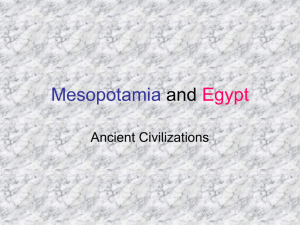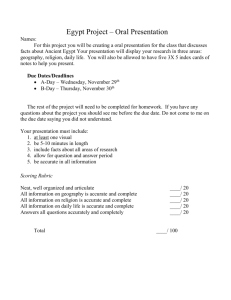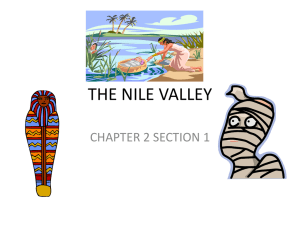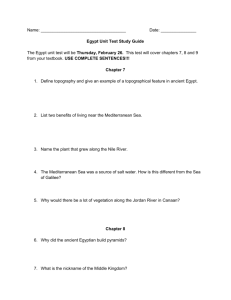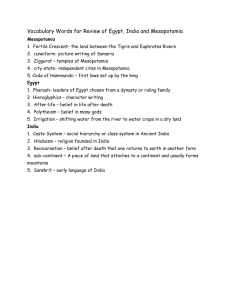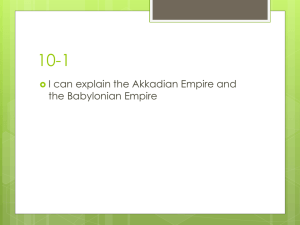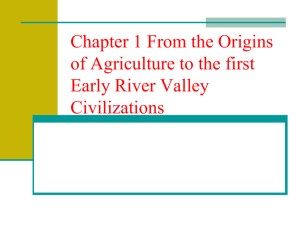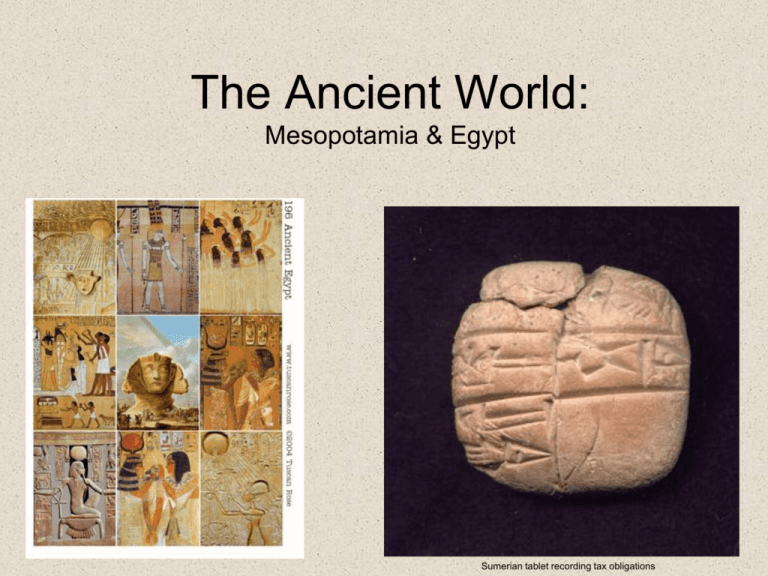
The Ancient World:
Mesopotamia & Egypt
Sumerian tablet recording tax obligations
Announcements
Friday, 3 Sept. 2010
• Questions:
• Website? Textbooks? Other?
• Class Attendance list
• Please place a check next to your name
• Next Class (Wed)
• Primary Source reading by Hammurabi
• Review for Map Quiz 1
Characteristics of a “Civilization”
•
•
•
•
•
•
Written records > oral memory
Specialization of labor > Subsistence
Strong government > individual clans
Social hierarchy
Urbanization > nomadic
Settled agriculture > pasturing, hunt-andgather
• Organized religion
P.E.R.S.I.A. + G.T.
• One method of organizing/analyzing historical
information.
•
•
•
•
•
•
•
P = politics
E = economics
R = religion
S = society
I/A = intellectual/artistic (cultural)
G = geography
T = technology
Mesopotamia
• Geography
• arable, unstable
• Religion
• polytheistic, patriarchial, pessimistic
• Politics
• theocracy oligarchymonarchy
• Intellectual/Artistic
• Cuneiform, astronomy, math, medicine, ziggurats
Overview of Ur
• This photograph gives a good idea of the size and complexity of
Ur, one of the most powerful cities in Mesopotamia (present
Iraq). In the lower right-hand corner stands the massive ziggurat
of Umammu.
Georg Gerster/Photo Researchers, Inc.
City of Ur (Mesopotamia)
Paying taxes at the ziggurat
Cuneiform
Egypt
• Geography
• “gift of the Nile”
• Politics
• pharaohs
• Society
• hierarchy
• Religion
• Polytheistic, final judgment
• Intellectual/artistic
• Pyramids, obelisks,
papyrus, medicine
Egypt: “Gift of the Nile”
•
•
‘View Show' to view and
zoom map
The unique geography of the Nile Valley left a stamp on ancient Egypt.
Fertile soil made Egypt wealthy, and the surrounding desert led to
periods of isolation from nearby Africa and Asian cultures.
Copyright © Houghton Mifflin. All rights reserved.
The fruits of the Nile River
Fishing along the Nile
Model of Beer- and Bread-making (Royal
Ontario Museum)
Reaping grain & scattering seed
King Tut hunts birds w/ his wife
Two sides of Narmer Palette
•
This palette comes from Hierakonpolis, the sacred city of the prehistoric
kingdom of Upper Egypt. It records the victory (over Delta) of King
Narmer, who is shown on one side wearing the crown of Upper Egypt
and on the other that of Lower Egypt. This monument commemorates
the union of the two halves of Egypt.
Jean Vertut
The pharaoh conquers an
enemy, while Horus holds a
slave from the Nile Delta
Egyptian religion
• Great variety
• Importance of afterlife
Papyrus
Review: Hammurabi’s Code as a
primary source
• What did we learn about
analyzing a primary source?
• 5 Ws
• Who is audience? Is there bias? Is it
complete?
• What can we extract from the document
about the society that produced it?
• What did we learn about
Hammurabi’s society?

